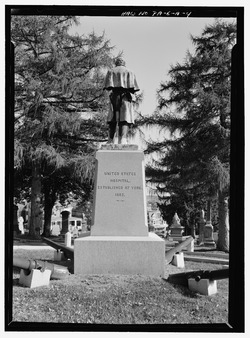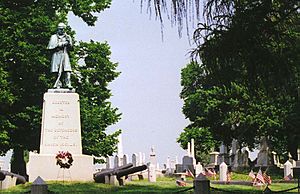York General Hospital (Pennsylvania) facts for kids
Quick facts for kids York General Hospital |
|
|---|---|
| Penn Common, York, Pennsylvania | |

Soldiers' Monument commemorating York General Hospital, Prospect Hill Cemetery, York, Pennsylvania
|
|
| Site information | |
| Controlled by | Union Army |
| Site history | |
| Built | 1862 |
| In use | July 1862–1865 |
| Battles/wars | American Civil War |
The York U.S. Army Hospital was one of the largest military hospitals in Pennsylvania during the American Civil War. It was built in York, Pennsylvania, to help Union soldiers who were hurt or sick. This hospital played a very important role in caring for thousands of soldiers during the war.
Hospital History and Purpose
The hospital opened in July 1862. It was located on Penn Common, a large, flat, grassy area south of downtown York. The hospital was huge, with many buildings. These included barracks for soldiers, infirmaries for treatment, offices, and support buildings. There were also laundries, stables, and even a place for soldiers who died.
Caring for Wounded Soldiers
Many of the first patients were soldiers wounded in the Battle of Antietam. This big battle happened on September 17, 1862. Hundreds of injured men were brought to York for care. Dr. Henry Palmer was the main surgeon for most of the war. He was from the 7th Wisconsin Infantry.
Community Support for the Hospital
People in Pennsylvania wanted to help the soldiers. Many groups were formed to support the hospital. For example, the Soldiers' Aid Society in Columbia, Pennsylvania, worked with churches. They raised money to help care for the patients at York General Hospital. This showed how communities came together during the war.
Soldiers' Rally for the Union
On April 2, 1863, about 600 soldiers gathered in the hospital's mess hall. These soldiers came from 20 different states that supported the Union. They held a rally to show their strong support for the Union cause.
They passed a resolution, which is like a formal statement. In it, they said there could be "no neutrals" in the war. They believed everyone should support the government. They were ready to fight and even die to protect their country. The soldiers felt that anyone not helping the government was an "enemy to his country."
They also spoke out against people who seemed to be working against the Union. They believed these people were trying to cause trouble. The soldiers wanted to make sure everyone knew they were still loyal. They were ready to fight for the "Union now and forever."
Impact of the Gettysburg Battle
In May 1863, a group called the Ladies’ Relief Association of Gettysburg sent supplies to the hospital. They also sent items to comfort Union soldiers. These soldiers had been wounded in the tough Battle of Chancellorsville.
Just days later, during the Confederate invasion of 1863, the hospital grounds were taken over. Parts of Early's division, including Avery's brigade from North Carolina, occupied the area.
After the Battle of Gettysburg, many more wounded soldiers came to York. Newspapers reported over a thousand, but the real number was much higher. Some estimates say about 2,500 soldiers from Gettysburg were brought to York.
By the end of the war, more than 14,000 soldiers had been treated at this hospital. Most soldiers who died there were sent back to their hometowns. However, nearly three dozen were buried in York's Prospect Hill Cemetery. A monument of a Union soldier stands there today, watching over their graves.
Hospital Closure and Legacy
In June 1865, newspapers announced that many federal hospitals were closing. The York General Hospital was one of them. The war was over, and these hospitals were no longer needed.
The hospital site became a city park called Penn Park. There is a large Soldiers and Sailors Monument there. It honors York's Civil War history and veterans. A bronze map nearby shows how the U.S. Army Hospital used to look.
Life at the Hospital: Library, Newspaper, and Mail
As more soldiers came to the hospital, staff looked for ways to keep them busy. Many soldiers were recovering but not yet ready to go home or back to their units. They needed things to do.
Hospital Library and Reading Room
By 1864, the hospital had a reading room. This gave soldiers a place to gather. The hospital also had a library that was open every day except Sunday. It had many books, including plays by William Shakespeare and poems by Lord Byron.
The library also had biographies of important figures like John Quincy Adams and Napoleon. These books were donated by groups like the U.S. Sanitary Commission. There were also religious books and daily newspapers from big cities.
The Cartridge Newspaper
Hospital staff even created their own newspaper called The Cartridge. Its goal was to help the sick and wounded soldiers. It aimed to cheer them up and give them a way to share their thoughts. The newspaper also wanted to make hospital life less boring.
The paper's name, "The Cartridge," showed their fighting spirit. They wrote that they would rather fight than give in to their enemies. They used their words as weapons against those who opposed the Union.
Mail Service for Soldiers
Soldiers could send and receive mail twice a day. Mail arrived at 9:30 a.m. and 3:30 p.m. Soldiers could send letters out at 7:00 a.m. and noon. They used special envelopes that said, "Soldier's Letter. U.S. Army General Hospital at YORK, PENN'A." Stamps cost three cents. This helped soldiers stay in touch with their families and friends.


